-

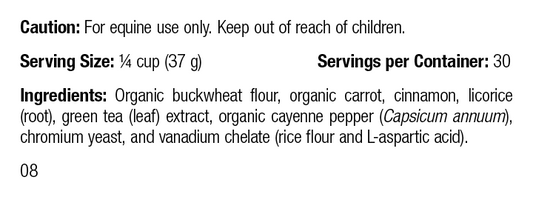
Equine Metabolic Support, 40 oz (1134 g)
Equine Metabolic Support, 40 oz (1134 g)
Vendor:Standard Process Inc(42)Regular price $97.90 USDRegular priceUnit price perEquine Metabolic Support is a metabolic supplement for horses that contains whole food ingredients to encourage healthy glucose metabolism and insulin function. Equine Metabolic Support includes a variety of whole food and other ingredients that may play a role in healthy metabolic processes of the horse by: Supporting pathways involved in healthy glucose metabolism Supporting healthy insulin function The realities of modern equine management may result in challenges to the metabolic pr...
-

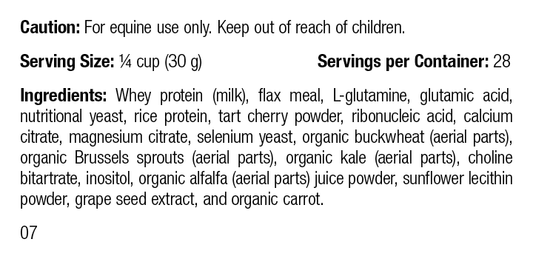
Equine Performance, 30 oz (850 g)
Equine Performance, 30 oz (850 g)
Vendor:Standard Process Inc(42)Regular price $110.55 USDRegular priceUnit price perEquine Performance, a performance horse supplement made with whole foods and other nutrients, may support the antioxidant pathways associated with exercise. Performance support Supports antioxidant pathways for exercise Aids in pathways associated with exercise performance and recovery Contains ingredients that support health during exercise in horses Supports healthy energy metabolism in performance horses Horses that train rigorously, travel, or compete may experience an inflammatory re...
-

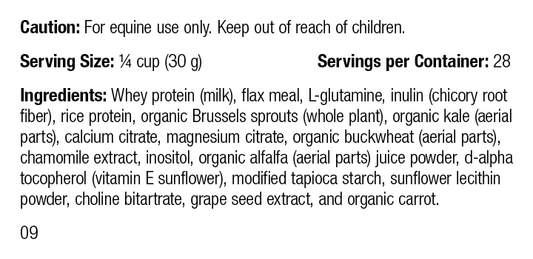
Equine GI Support, 30 oz (850 g)
Equine GI Support, 30 oz (850 g)
Vendor:Standard Process Inc(42)Regular price $90.75 USDRegular priceUnit price perEquine GI Support is a supplement for horses that provides prebiotic inulin and supports antioxidant signaling pathways associated with gut health. The equine gastrointestinal (GI) tract is an extensive set of organs that must efficiently function together to support adequate nutrition for the horse to maintain a cooperative working attitude and pleasant disposition. Horses experiencing a challenge to the GI tract may or may not display a perceivable change in behavior, eating patterns, or ...
-

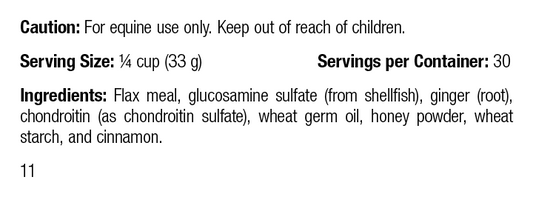
Equine Mobility Support, 40 oz (1134 g)
Equine Mobility Support, 40 oz (1134 g)
Vendor:Standard Process Inc(42)Regular price $83.05 USDRegular priceUnit price perEquine Mobility Support is a supplement that may help a horse by promoting healthy joint function, flexibility, and mobility. Equine Mobility Support is a unique blend of whole foods and other ingredients that can help both the performance and retired horse. Contains glucosamine and chondroitin that can support mobility and range of motion. Promotes healthy joint function and mobility Supports joint health Offers glucosamine and chondroitin to support cartilage and bone health Provides ant...
-

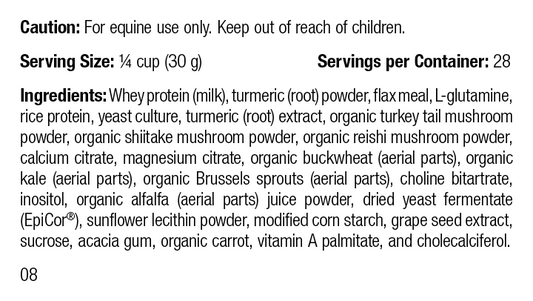
Equine Immune Support, 30 oz (850 g)
Equine Immune Support, 30 oz (850 g)
Vendor:Standard Process Inc(42)Regular price $110.55 USDRegular priceUnit price perEquine Immune Support is a horse immune system supplement that supports the innate and adaptive immune response and contains whole food ingredients. Encourages and supports the innate and adaptive immune response that is necessary for the health, performance, and stamina of the horse Powder format for simple addition to food Unique formula includes an array of ingredients derived from functional foods that may support immune cell health Contains turmeric and antioxidant Vitamin A Traini...
LET'S LEARN MORE ABOUT
Supplements for Horses
Common Health Issues in Horses
Signs Your Horse May Not Be Feeling Well
Why Supplements Are Important for Horse Health
Talk to Us
If you need help with starting up the course or getting access to the recipes and videos, please don't hesitate to contact us via call/text at +213 394 2923 / email drruthroberts@drruthroberts.com.













